A Bittersweet Life
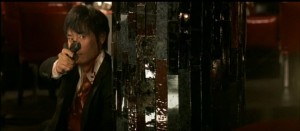 Back in the mid-1990s, when gay cinema was just coming out of the closet and into the mainstream, there was a charming, formulaic lesbian comedy called The Incredibly True Adventures of 2 Girls in Love. There’s nothing particular special about the film and I can’t face watching it again, since there’s no doubt, with its quaint view of lipstick lesbians finding their way through high school and into each other’s arms, that it would be incredibly dated.
Back in the mid-1990s, when gay cinema was just coming out of the closet and into the mainstream, there was a charming, formulaic lesbian comedy called The Incredibly True Adventures of 2 Girls in Love. There’s nothing particular special about the film and I can’t face watching it again, since there’s no doubt, with its quaint view of lipstick lesbians finding their way through high school and into each other’s arms, that it would be incredibly dated.
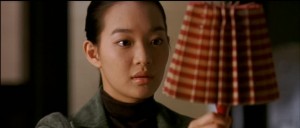 The knock on the film at the time was that it was generic, but it should be given a pass because gay filmmakers have to make their clichéd romantic comedies too, and they’ll move on to more mature work once they get it out of their system. There’s a subtextual wisdom in that notion; the best way to become fully accepted by society is to become boring and rote.
The knock on the film at the time was that it was generic, but it should be given a pass because gay filmmakers have to make their clichéd romantic comedies too, and they’ll move on to more mature work once they get it out of their system. There’s a subtextual wisdom in that notion; the best way to become fully accepted by society is to become boring and rote.
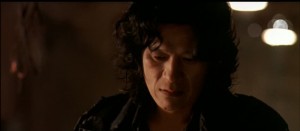 The same could be said about Jee-woon Kim’s A Bittersweet Life, as an example of the South Korean genre film* previously explored by Chan-wook Park (Oldboy, Sympathy for Lady Vengeance, I’m a Cyborg But That’s OK), Joon-ho Bong (The Host, Mother) and Sang-soo Im (The Housemaid). These four filmmakers weave in and out of established genre material, whether it’s the monster movie The Host, the women-in-prison movie Sympathy for Lady Vengeance or the military tribunal in J.S.A., or Kim’s traversing through serial killers in I Saw the Devil or mobster mechanics in A Bittersweet Life.
The same could be said about Jee-woon Kim’s A Bittersweet Life, as an example of the South Korean genre film* previously explored by Chan-wook Park (Oldboy, Sympathy for Lady Vengeance, I’m a Cyborg But That’s OK), Joon-ho Bong (The Host, Mother) and Sang-soo Im (The Housemaid). These four filmmakers weave in and out of established genre material, whether it’s the monster movie The Host, the women-in-prison movie Sympathy for Lady Vengeance or the military tribunal in J.S.A., or Kim’s traversing through serial killers in I Saw the Devil or mobster mechanics in A Bittersweet Life.
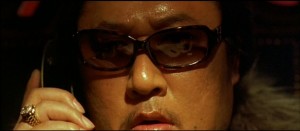 That might excuse the opening ½ hour of A Bittersweet Life, which is where Kim tries to work out the kinks while going through well worn territory of the quiet but dangerous henchman, Sun-woo (actor/model Byung-hun Lee from I Come with the Rain, G.I. Joe and Park’s J.S.A. ), so emotionally detached and on edge that he sleeps on his own couch instead of in a bed. He’s assigned to protect the boss’s mistress Hee-soo (played by Min-a Shin), who is much, much younger and, as “President” Baek (President seems to be an awkward translation for Head of the Family) is worried about, likely to stray. There’s not much unique about the opening act of A Bittersweet Life, Sun-woo is challenged by a potential emotional connection to Hee-soo which threatens to harm his working environment. No matter how much he deflects, she knows he’s there to make sure she behaves, not to “protect” her. Hee-soo presses him on being an enforcer, to which he states that he just works for a hotel (owned by the mob). She replies, “So you’re an enforcer for the hotel?”
That might excuse the opening ½ hour of A Bittersweet Life, which is where Kim tries to work out the kinks while going through well worn territory of the quiet but dangerous henchman, Sun-woo (actor/model Byung-hun Lee from I Come with the Rain, G.I. Joe and Park’s J.S.A. ), so emotionally detached and on edge that he sleeps on his own couch instead of in a bed. He’s assigned to protect the boss’s mistress Hee-soo (played by Min-a Shin), who is much, much younger and, as “President” Baek (President seems to be an awkward translation for Head of the Family) is worried about, likely to stray. There’s not much unique about the opening act of A Bittersweet Life, Sun-woo is challenged by a potential emotional connection to Hee-soo which threatens to harm his working environment. No matter how much he deflects, she knows he’s there to make sure she behaves, not to “protect” her. Hee-soo presses him on being an enforcer, to which he states that he just works for a hotel (owned by the mob). She replies, “So you’re an enforcer for the hotel?”
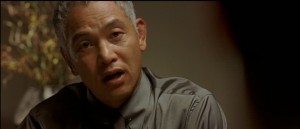 It’s in the quiet moments between Hee-soo and Sun-woo where the movie finally loosens up. Kim has already shown us that he can make the camera look like it’s dancing, with his tracking shots laying out the hotel’s restaurant and bar, and during an early violent confrontation for Sun-woo. But the brutality that follows shifts from genre to genre almost imperceptibly; a face off against a group of foes has Sun-woo’s adversaries looking like extras from a post-apocalyptic film (it is very Terminator), mud and fire enveloping a warehouse during a post-burial bargaining. That A Bittersweet Life eventually turns into a western in its final confrontations isn’t the odd part, it’s the way Kim goes about it. The third act slows down just as it gets started, opening with a scene with a gunrunner who loves looking cool and his toys, but moreso his toys. The film stops to be funny during this sequence, even engaging in some Laurel and Hardy-style wordplay. Kim’s humor is what differentiates the film anyway, exemplified by a Godard-ian moment where a cleaning woman mops up the blood emanating from Sun-Woo, while he hangs upside down, pleading for her help.
It’s in the quiet moments between Hee-soo and Sun-woo where the movie finally loosens up. Kim has already shown us that he can make the camera look like it’s dancing, with his tracking shots laying out the hotel’s restaurant and bar, and during an early violent confrontation for Sun-woo. But the brutality that follows shifts from genre to genre almost imperceptibly; a face off against a group of foes has Sun-woo’s adversaries looking like extras from a post-apocalyptic film (it is very Terminator), mud and fire enveloping a warehouse during a post-burial bargaining. That A Bittersweet Life eventually turns into a western in its final confrontations isn’t the odd part, it’s the way Kim goes about it. The third act slows down just as it gets started, opening with a scene with a gunrunner who loves looking cool and his toys, but moreso his toys. The film stops to be funny during this sequence, even engaging in some Laurel and Hardy-style wordplay. Kim’s humor is what differentiates the film anyway, exemplified by a Godard-ian moment where a cleaning woman mops up the blood emanating from Sun-Woo, while he hangs upside down, pleading for her help.
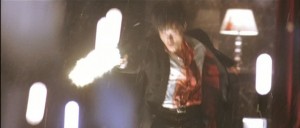 The off-kilter humor is hardly the only thing that A Bittersweet Life mines from fellow countryman Chan-wook Park’s Oldboy. So many scenes and moments, elaborate slow-motion battles with classical music, an obstinate villain who reads major infractions from minor points, a finale set on a glossy studio set surrounded by water, a young woman with a strange relationship with her much older keeper, and on and on. But Kim doesn’t provide us with Oldboy’s gut punch conclusion** (which prevents me from re-naming ABS as Ode-boy), or any sort of ironic idea. No matter how good the acting, how stylish the visuals, or efficient the screenplay, A Bittersweet Life never convinces us that it’s not a movie. We never get a sense of the mob hierarchy, other than how henchmen are forced into participating in a pyramid scheme of power, where they can’t advance even if they’re willing to prostrate themselves. It sounds illogical, but maybe that was the point all along?
The off-kilter humor is hardly the only thing that A Bittersweet Life mines from fellow countryman Chan-wook Park’s Oldboy. So many scenes and moments, elaborate slow-motion battles with classical music, an obstinate villain who reads major infractions from minor points, a finale set on a glossy studio set surrounded by water, a young woman with a strange relationship with her much older keeper, and on and on. But Kim doesn’t provide us with Oldboy’s gut punch conclusion** (which prevents me from re-naming ABS as Ode-boy), or any sort of ironic idea. No matter how good the acting, how stylish the visuals, or efficient the screenplay, A Bittersweet Life never convinces us that it’s not a movie. We never get a sense of the mob hierarchy, other than how henchmen are forced into participating in a pyramid scheme of power, where they can’t advance even if they’re willing to prostrate themselves. It sounds illogical, but maybe that was the point all along?
 * The only notable South Korean filmmaker who has gone out on his own is Ki-duk Kim, who has created a specific brand of misery-inducing message films like Bad Guy, The Isle, 3-Iron, and Spring, Summer, Fall, Winter… and Spring. No matter the quality of the film (and he’s quite prolific), you always know you’re watching a Kim film.
* The only notable South Korean filmmaker who has gone out on his own is Ki-duk Kim, who has created a specific brand of misery-inducing message films like Bad Guy, The Isle, 3-Iron, and Spring, Summer, Fall, Winter… and Spring. No matter the quality of the film (and he’s quite prolific), you always know you’re watching a Kim film.
** The final scenes of A Bittersweet Life suggest that Sun-woo has a cyborgian amount of fortitude, less so in the more sensible director’s cut.



